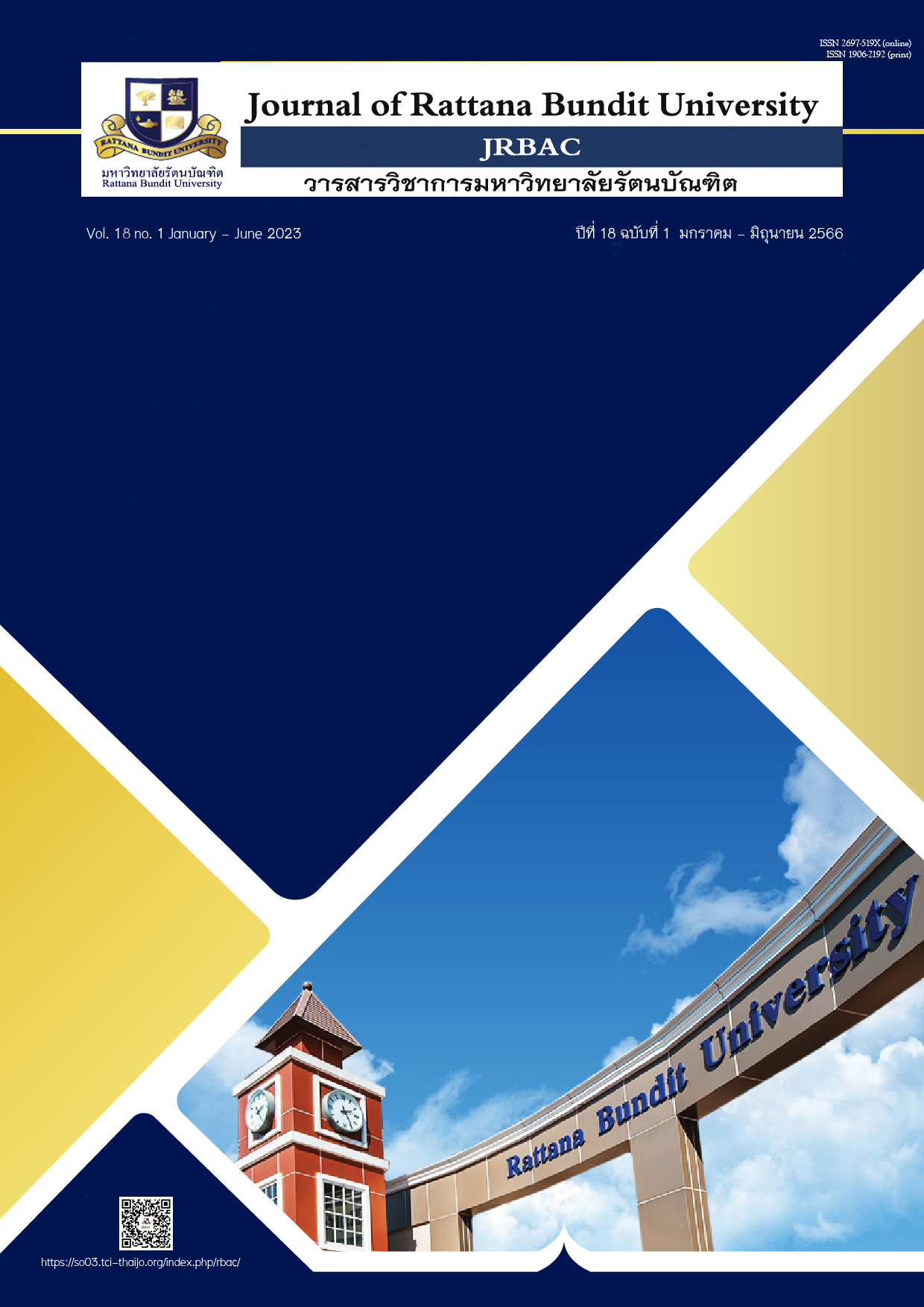การวิเคราะห์องค์ประกอบเชิงยืนยันแบบประเมินคุณภาพชีวิตผู้สูงอายุขององค์การอนามัยโลก กรณีศึกษา สมาชิกชมรมผู้สูงอายุในเขตกรุงเทพมหานคร
Main Article Content
บทคัดย่อ
บทความวิจัยนี้มีจุดมุ่งหมายเพื่อตรวจสอบองค์ประกอบเชิงยืนยันแบบประเมินคุณภาพชีวิตผู้สูงอายุของ องค์การอนามัยโลกกับข้อมูลเชิงประจักษ์ กลุ่มตัวอย่างที่ใช้ในการวิจัย ได้แก่ ผู้สูงอายุที่เป็นสมาชิกชมรมผู้สูงอายุในเขตกรุงเทพมหานครจำนวน 815 คน ได้มาจากการสุ่มตัวอย่างแบบหลายขั้นตอน เครื่องมือที่ใช้ในการรวบรวมข้อมูลคือแบบประเมินคุณภาพชีวิตของผู้สูงอายุ จัดทำโดยองค์การอนามัยโลก โดยใช้สถิติพื้นฐานในการวิเคราะห์องค์ประกอบเชิงยืนยันอันดับสองในการวิเคราะห์ข้อมูล ผลการวิจัย พบว่า องค์ประกอบทั้ง 6 ด้านของแบบประเมินคุณภาพชีวิตผู้สูงอายุที่จัดทำขึ้นโดยองค์การอนามัยโลก ตามภาวะสันนิษฐานมีความสอดคล้องกับข้อมูลเชิงประจักษ์ โดยมีค่าน้ำหนักองค์ประกอบในด้านของ ความสำเร็จและความคาดหวัง อยู่ในระดับสูงที่สุด รองลงมาได้แก่ การมีปฏิสัมพันธ์ทางสังคม การมีปฏิสัมพันธ์กับคนใกล้ชิด ความเป็นตัวของตัวเอง ความสามารถในการรับรู้ และ การเผชิญหน้ากับความตาย
Article Details

อนุญาตภายใต้เงื่อนไข Creative Commons Attribution-NonCommercial-NoDerivatives 4.0 International License.
เอกสารอ้างอิง
กรมกิจการผู้สูงอายุ. (2565). แผนปฏิบัติการด้านผู้สูงอายุระยะที่ 3 (พ.ศ.2566-2580). https://www.dop.go.th/download/laws/th1653553501-843_0.pdf
กรมกิจการผู้สูงอายุ. (2565). สถิติผู้สูงอายุ สัญชาติไทย และ มีชื่ออยู่ในทะเบียนบ้าน มกราคม 2565. https://www.dop.go.th/th/know/1/1159
กระทรวงการพัฒนาสังคมและความมั่นคงของมนุษย์. (2561). สถิติผู้สูงอายุของประเทศไทย 77 จังหวัด ณ วันที่ 31 ธันวาคม 2561. กรมการปกครอง.
ขวัญใจ ทองศรี. (2564). คุณภาพชีวิตที่ดีตามแนวพุทธจิตวิทยา. วารสาร มจร. มนุษยศาสตร์ปริทรรศน์, 7(2), 322-333.
จุฬาลงกรณ์มหาวิทยาลัย คณะพยาบาลศาสตร์ และสำนักงานกองทุนสนับสนุนการสร้างเสริมสุขภาพ. (2561). คู่มือ เรียนรู้เข้าใจวัยสูงอายุ. ยืนยงการพิมพ์.
พระพรหมคุณาภรณ์ (ป.อ.ปยุตฺโต). (2557). สุขภาวะองค์รวมแนวพุทธ. วัดญาณเวศกวัน.
วชิรญาณ์ จิตต์รุ่งเรือง. (2560). คุณภาพชีวิตของผู้สูงอายุในศูนย์พัฒนาการจัดสวัสดิการสังคมผู้สูงอายุบ้านบางละมุง จังหวัดชลบุรี (สารนิพนธ์มหาบัณฑิต). มหาวิทยาลัยบูรพา.
สำนักงานสถิติแห่งชาติ. (2561). สถิติบอกอะไร ผู้สูงวัยปัจจุบันและอนาคต. http://www.nso.go.th/sites/2014/Pages/Press_Release/2561/N10-04-61-1.aspx
สิน พันธุ์พินิจ. (2554). เทคนิคการวิจัยทางสังคมศาสตร์. วิทยพัฒน์.
สุธินี ศิวะพฤกษ์พงศ์. (2560). การเตรียมตัวและยอมรับความตายในโครงการเผชิญความตายอย่างสงบของเครือข่ายพุทธิกา. มหาวิทยาลัยศิลปากร.
อรรถกร เฉยทิม. (2560). ความสุขของผู้สูงอายุในชมรมผู้สูงอายุ เขตกรุงเทพมหานคร. มหาวิทยาลัยศิลปากร.
Asian Development Bank Institute. (2019). Aging societies policies and perspectives. ADB Institute.
Chanda, S., & Mishra, R. (2019). Impact of transition in work status and social participation on cognitive performance among elderly in India. BMC Geriatrics, 1-10.
Choeitim, A. (2017). Happiness of the elderly in the Senior Citizens Club in Bangkok. Silpakorn University. (in Thai)
Chulalongkorn University, Faculty of Nursing and the Office of the Health Promotion Fund. (2018). Handbook for learning to understand the elderly. YuenYong Printing. (in Thai)
Department of Older Persons. (2022). Action Plan Elderly, Phase 3 (2023-2037). https://www.dop.go.th/download/laws/th1653553501-843_0.pdf (in Thai)
Department of Older Persons. (2022). Statistics of the elderly people of Thai nationality and whose name is in the household register January 2022. https://www.dop.go.th/th/know/1/1159 (in Thai)
Gebrye, T., Okoye, E. C., Akosile, C. O., Onwuakagba, I. U., Uwakwe, R., Igweze, C. C., & Fatoye, F. (2022). Adaptation and validation of the Nigerian (Igbo) Version of the WHOQOL-OLD Module. Research on Social Work Practice, 1-12.
Hagood, E. W., & Gruenewald, T. L. (2018). Positive versus negative priming of older adults’ generative value: Do negative messages impair memory? Aging & Mental Health, 22(2), 257-260.
He, X., Shek, D. T., Du, W., Pan, Y., & Ma, Y. (2022). The relationship between social participation and subjective well-being among older people in the Chinese culture context: The mediating effect of reciprocity beliefs. International Journal of Environmental Research and Public Health, 19(23), 1-14. https://doi.org/10.3390/ijerph192316367
Jitrungrueang, V. (2017). The quality of life of the elderly in Ban Bang La-Mung Elderly Social Welfare Development Center Chonburi Province (Master's thesis). Burapha University. (in Thai)
Li, C., Jiang, S., Li, N., & Zhang, Q. (2017). Influence of social participation on life satisfaction and depression among Chinese elderly: Social support as a mediator. Journal of Community Psychology 46(2).
Ministry of Social Development and Human Security. (2018). Statistics of the elderly in Thailand 77 provinces. As of 31 December 2018. Department of Provincial Administration.
National Statistical Office. (2018). What do the statistics say about elderly, present and future. http://www.nso.go.th/sites/2014/Pages/Press_Release/2561/N10-04-61-1.aspx (in Thai)
Noknoi, J. & Boriphan, W. (2017). Quality of life of the elderly in Songkhla Province. Princess of Naradhiwas University Journal, 9(3), 94–105. (in Thai)
Panpinij, S. (2011). Social science research techniques. Witthayaphat. (in Thai)
Paterson, T. S., Yeung, S. E., & Thornton, W. L. (2016). Positive affect predicts everyday problem-solving ability in older adults. Aging & Mental Health, 20(8), 871-879.
Payutto, P. A.. (2014). Holistic well-being in Buddhism. Wat Nyanavesakavan. (in Thai)
Peel, N. M., Bartlett, H. P., & Marshall, A. L. (2007). Measuring quality of life in older people: Reliability and validity of WHOQOL-OLD. Australasian Journal on Ageing, 26(4), 162-167.
Peitsch, L., Tyas, S. L., Menec, V. H., & John, P. D. S. (2016). General life satisfaction predicts dementia in community living older adults: A prospective cohort study. International Psychogeriatrics, 28(7), 1101-1109.
Pothisiri, W., Miguel, P., & Vicerra, M. (2021). Cognitive function, co-residence, and social participation among older persons in Thailand. The Social Science Journal, 1-14.
Santos, L. F., Oliveira, L. M., Barbosa, M. A., Nunes, D. P., & Brasil, V. V. (2015). Quality of life of elderly who participate in group health promotion. Enfermería Global, 40, 23-32.
Schumacker, R. E. & Lomax, R. G., (2010). A beginner’s guide to structural equation modeling (3rd ed.). Lawrence Erlbaum Associates.
Sivaphrukphong, S. (2017). The preparation and acceptance of death in the peaceful death of Buddhika. Silpakorn University. (in Thai)
Thongsri, K. (2021). Good quality of life according to Buddhist psychology. Journal of MCU Humanities Review, 7(2), 325-336.
UNESCO. (1993). Quality of life: Orientation to population education. UNESCO.
World Health Organization. (2006). WHOQOL-OLD MANUAL. https://www.who.int/mental_health/evidence/WHOQOL_OLD_Manual.pdf
World Health Organization. (2020). WHOQOL Measuring quality of life. https://www.who.int/toolkits/whoqol
World Health Organization. (2022, February 5). Aging. https://www.who.int/health-topics/ageing#tab=tab_1


